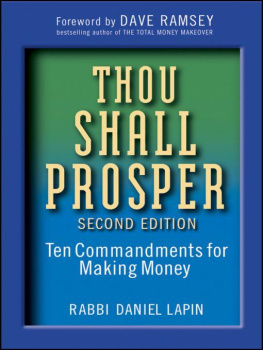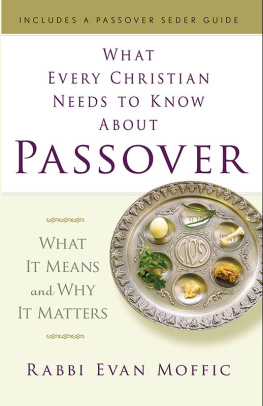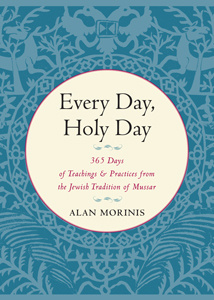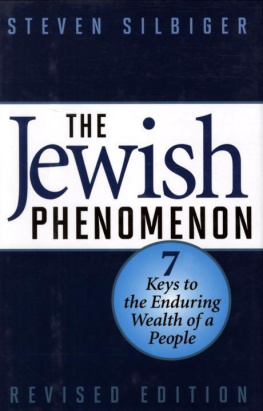Table of Contents

Copyright 2010 by Rabbi Daniel Lapin. All rights reserved.
Published by John Wiley & Sons, Inc., Hoboken, New Jersey.
Published simultaneously in Canada.
No part of this publication may be reproduced, stored in a retrieval system, or transmitted in any form or by any means, electronic, mechanical, photocopying, recording, scanning, or otherwise, except as permitted under Section 107 or 108 of the 1976 United States Copyright Act, without either the prior written permission of the Publisher, or authorization through payment of the appropriate per-copy fee to the Copyright Clearance Center, Inc., 222 Rosewood Drive, Danvers, MA 01923, 978-750-8400, fax 978-646-8600, or on the web at www.copyright.com . Requests to the Publisher for permission should be addressed to the Permissions Department, John Wiley & Sons, Inc., 111 River Street, Hoboken, NJ 07030, 201-748-6011, fax 201-748-6008, e-mail: permcoordinator@wiley.com.
Wiley also publishes its books in a variety of electronic formats. Some content that appears in print may not be available in electronic books. For more information about Wiley products, visit our Web site at www.wiley.com .
eISBN : 978-0-470-54170-8
Foreword
I didnt grow up as a rich kid, but I did grow up as a business kid. My father had this fantastic entrepreneurial attitude, and he taught me about goal setting, hard work, and focused intensity. I remember going up to him one summer when I was 12 and saying, Dad, I need some money.
He replied, Youre 12 years old. You dont need money, what you need is a job!
So, I got to learn about cutting grass that summer. More than that, I learned about setting goals, marketing, and determination. I printed up business cards and built up quite the little enterprise.
The most important business lesson my dad taught me was that money comes from work. Dont talk to me about what you deserve or what youre entitled to. No one is going to hand you anything. This has been true since the beginning of time: Youve got to leave the cave, kill something, and drag it home. Then its yours.
Im grateful to my dad for teaching me that lesson from an early age, especially since its an attitude I dont see much anymore. Thomas Edison said it pretty well: Opportunity is missed by most people because it is dressed in overalls and looks like work. More and more, it seems like people want wealth, but they dont want to work for it. They need a shot in the arm, a call back to the virtue, ethics, morality, and importance of business.
And that, my friend, is why I love this book.
I didnt know of Rabbi Lapin until a friend gave me a copy of Thou Shall Prosper in a mens Bible study group a couple of years ago. I had never heard of the book before, but I flipped through it and later read it in detail with the study group. I was completely blown away. It is definitely one of the top financial books I have ever readand Ive read a lot of them.
Lapin admits that hes not a star of finance, and thats part of the brilliance of the book. When you read a book written by someone like Bill Gates or Warren Buffett, you have to recognize that these arent really regular people. Chances are you dont have a Bill Gates living next door to you. All the stars have to line up to have that kind of success, and you get someone like that once in a blue moon.
Thou Shall Prosper is about regular people. Whether youre a part time coffee clerk or a big time corporate CEO, Lapin shows you a whole new mind set about work and about money. Did you catch that? Work and money. Most people never realize the two are connected!
Beyond the work-money connection, Lapins overall thesis is fascinating. Some people may not be comfortable with it, but I think history shows it to be true: Jewish people are unusually gifted at making and managing money. Its not a racial thing; its a cultural thing. There is something in the cultural mind set and national experience of the Jewish people that we need to recognize if we want to win with money.
Lapin understands that money isnt just physical; its a spiritual reality. Its spiritual in that it isnt about folded pieces of paper, and it isnt about what those little slips of paper can buy. It is about people and relationships . Money is the buzz; the connection that makes our interpersonal networks rich and fulfilling.
In a sense, money connects two dreamers. Think about that. I personally love to ski. I enjoy hitting the slopes and spending that time with my family, and it doesnt bother me at all to spend money doing that particular activity.
I imagine it is another persons dream to own and operate a luxury ski resort. He is fulfilled and motivated by providing a great service and outstanding accommodations to skiers. So, when I go on vacation, I hand him my money and he hands me my keys and skis. Were both excited about the transaction, we both get what we want, and both our dreams are fulfilled. In that moment, it isnt about money. Money is just what facilitated our relationship.
These days, however, businessand businesspeopleare getting a bad rap. The pursuit of wealth through a successful business is not viewed as an honorable enterprise by some, and I honestly cannot understand why that is.
One of the things that most irritates me as a successful businessman is the often stated belief that wealth is a by product of dishonesty or moral shortcomings. Some peoplewhom I not so affectionately call losershonestly believe that the only way for one person to gain wealth is to lie to, cheat, or take advantage of someone else. The idea of an honorable wealthy person is totally foreign to many people, and thats just sad.
A lot of people, including many in the media, propagate what my friend Tim Sanders calls a scarcity mentality. Its like theres a limited amount of wealth in the world, and one mans success directly causes anothers failure. Therefore, the only way for me to get more money is to take it away from someone else. What a crock!
But people from all walks of life buy into this nonsense, dont they? I often see this at two opposite extremes: greedy poor people and guilty rich people. Now, Im not saying all poor people are greedy, and Im not saying all rich people are guilty. However, our society often tries to steer us along one of these two paths. Chances are you know people who represent both sides.
The greedy poor people are those who have little ambition, work their nine-to-five jobs, go home and sit on the sofa, complain about how the little man cant get ahead, havent read a book since high school, and feel like the world owes them something. It may be free health care, free college education, free retirement, free insurance, or a total free ride. They think that just because they work their eight-hour-a day jobs, theyre doing all they can. And if they dont make enough money doing it, then someone else should step in and take care of them.
The guilty rich people are those who work like crazy people, are mentally engaged in business, think about new and creative ways to service others, know how to turn $1 into $100, fully fund college accounts for their kids, read a book a month, build up a large retirement accountand then feel guilty about it. They listen to the lies about the dishonesty and mistrust of business, and they become ashamed of their success. They give a great deal to good causes, not out of a sense of duty or charity, but out of some misguided notion that their wealth has put others into poverty.
Let me be crystal clear: Both of these groups have missed the mark. There is a dignity to wealth creation through honorable business that is unlike anything else on earth. There is no crime in handing someone a dollar for a job well done, and theres certainly no shame in accepting it for providing the service. Thats why Rabbi Lapin calls every dollar you earn a certificate of appreciation from your customers.
Next page







